#maternal health
Text
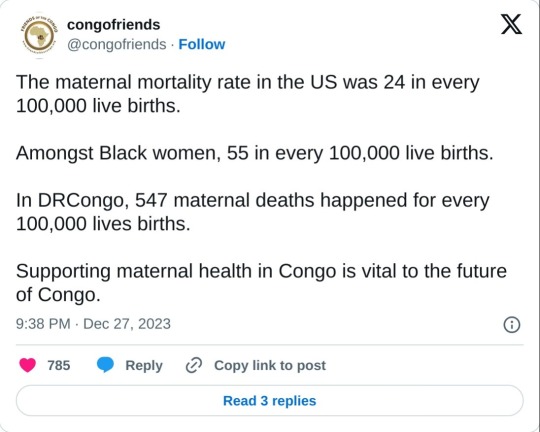
this statistic for the drc's maternal mortality rate comes from this paper about trends in maternal mortality from 2000 to 2020. the estimates in the paper came from the WHO, UNICEF, UNFPA, World Bank Group and UNDESA/Population Division (if you want to find this statistic, go to Annex 4.)
this paper published by BMC Pregnancy and Childbirth about maternal mortality in the DRC comes to a conclusion of 620 deaths per 100,000 live births. this study was published in 2022, with data collected from between 2015 and 2020.
#congo#dr congo#drc#congo genocide#free congo#democratic republic of congo#my text#maternal mortality#maternal health
402 notes
·
View notes
Text


Krystal Anderson, a former cheerleader for the Kansas City Chiefs, died of sepsis last week following a stillbirth, according to her family. She was 40 years old.
Anderson, known to her friends as “Krissy,” was hospitalized at five months pregnant and delivered her daughter, Charlotte Willow, after doctors were unable to locate a heartbeat, friends told FOX4 News. She developed a fever a day after the birth. Her condition worsened and she battled sepsis, which eventually led to organ failure. Despite being placed on life support and undergoing three surgeries, she died early Wednesday morning.
“I feel lost,” her husband, Clayton Anderson, told the station. “There’s a lot of people in this house and it feels empty.”
In her post-NFL career, Anderson taught yoga and worked as a software engineer at Oracle Health. She “fiercely advocated” for both Black women in STEM and women’s health, according to an obituary. She also had a philanthropic streak, and worked with Big Brothers and Big Sisters of KC, the perinatal bereavement nonprofit Gabriella’s Little Library, and the Oracle Health Foundation.
“She was an absolute force for good. She made every room just light up,” her husband said.
While overall maternal deaths in the U.S. have steadily ticked up over the past two decades, Black women remain two to three times more likely to die in childbirth than white women, according to data from the Centers for Disease Control and Prevention. With the risks to Black mothers exacerbated by implicit bias and medical racism, they are also more likely to experience life-threatening complications like preeclampsia, postpartum hemorrhage, and blood clots.
“It’s, you know, we say, the best country in the world, right?” Anderson’s husband told FOX4 News. “Not if you’re a Black pregnant woman, it’s not—and that needs to change.”
(continue reading)
59 notes
·
View notes
Text
FACT: Banning abortion dramatically reduces the rate of abortion— and the number of women dying from abortion
Restrictive state-level abortion policies are associated with not having an abortion at all. Calculated to account for the rate of criminal/illegal abortions.
“Women who lived in a state where abortion access was low were more likely than women living in a state with greater access to use highly effective contraceptives rather than no method” Not only are abortion rates lower where abortions are illegal, but unwanted pregnancy rates too. People are more careful. (From the Guttmacher Institute, former statistics arm of Planned Parenthood.) https://www.guttmacher.org/journals/psrh/2015/05/state-abortion-context-and-us-womens-contraceptive-choices-1995-2010
29% of Medicaid eligible pregnant women who would have an abortion with Medicaid coverage, instead give birth. Calculated to account for the rate of criminal/illegal abortions. https://bmcwomenshealth.biomedcentral.com/articles/10.1186/s12905-019-0775-5
Analysis of statewide data from the three States indicated that following restrictions on State funding of abortions, the proportion of reported pregnancies resulting in births, rather than in abortions, increased in all three States. Calculated to account for the rate of criminal/illegal abortions. https://www.ncbi.nlm.nih.gov/pmc/articles/PMC1580169/pdf/pubhealthrep00193-0013.pdf
Approximately one-fourth of women who would have Medicaid-funded abortions instead give birth when this funding is unavailable … Studies have found little evidence that lack of Medicaid funding has resulted in illegal abortions. Calculated to account for the rate of criminal/illegal abortions.
We find that a 100-mile increase in distance to the nearest clinic is associated with 30.7 percent fewer abortions and 3.2 percent more births. Calculated to account for the rate of criminal/illegal abortions.
https://onlinelibrary.wiley.com/doi/10.1002/pam.22263
rate of abortion is found to be lower in states where access to providers is reduced and state policies are restrictive. https://pubmed.ncbi.nlm.nih.gov/9099567/
A wait time as short as 72 hours is enough to start decreasing abortion rates. https://www.sciencedirect.com/science/article/abs/pii/S1049386716300603
Abortion decreased after being restricted: https://www.ncbi.nlm.nih.gov/pmc/articles/PMC4050978/
Michigan banned Medicaid from paying for abortion. Abortion rates dropped. https://pubmed.ncbi.nlm.nih.gov/8135922/
The farther away a woman is from an abortion facility, the less likely she is to get one: https://www.jstor.org/stable/2134397?seq=1#page_scan_tab_contents
Some restrictions were enacted in Eastern Europe in the 80s and 90s. The rates of abortion AND pregnancy rates both decreased.
Fetal development information and required waiting periods lead to less abortion:
A study in Louisiana and Maryland found that laws against abortion were effective at stopping abortions
Countries with abortion bans also have dramatically lower maternal mortality compared to other countries in the region with dangerously permissive abortion laws.
“Contrary to the notion proposing a negative impact of restrictive abortion laws on maternal health, the abortion mortality ratio did not increase after the abortion ban in Chile. Rather, it decreased over 96 percent.”
Mexican states that ban and restrict abortion have better MMR than permissive states: “Over the 10-year period, states with less permissive abortion legislation exhibited lower Maternal Mortality Rates than more permissive states.”
Poland bans all abortion except LotM and has the world’s lowest MMR (2/100000). Malta bans almost all abortions and has MMR of 6/100000
It also works in reverse. Multiple countries have seen an increase in MMR after legalizing abortion.
Guyana legalized abortion and achieved the worst MMR on the continent. (Compare that to Chile, which has constitutional protections for the unborn and an MMR that dropped by over 96% AFTER abortion was banned.)
Ethiopia legalized abortion and it made MMR worse: “Although abortion was not legalised on demand, it was legalised on broad socio-economic grounds: the Center for Reproductive Rights place it in the same category as the UK and Finland which, while not strictly allowing abortion on demand, do allow something close to that in practice.” … “Over the period of legalisation, the proportion of women with septic shock more than doubled, with the same result for organ failure. The proportion admitted to intensive care nearly tripled. Between 2008 and 2014, the percentage of women receiving post-abortion care who have severe complications increased by over 50%, from 7% to 11%. During this time, the proportion of women presenting with organ failure quadrupled, the proportion with peritonitis quintupled, and the proportion with shock nearly doubled.”
Ireland’s once-stellar MMR also increased after legalizing abortion. (Compare to Poland and Malta with almost total bans and to the UK where abortion is essentially legal in demand up to the second trimester.)
The pattern repeats in Asia. Nepal, where there is no restriction on abortion, has one of the world’s highest maternal mortality rates. (The lowest in the region is Sri Lanka, with a rate fourteen times lower than Nepal and very good restrictions on abortion.)
In addition, less people are being lured into abortion under the false impression that it’s “safe and legal”. If any of them die of illegal abortion, it’s because they knowingly committed a crime. There will no longer be cases like 17-year-old Roselle Owens, Sarah Dunn, Tonya Reaves and Cree Erwin-Sheppard (to name a few) who were killed by abortion because they were lied to about the risks.
#pro life#pro choice#abortion#tw abortion#tw murder#tw death#tw ab*rtion#abortion debate#maternal mortality#death from legal abortion#abortion is not healthcare#abortion is not a right#abortion kills women#abortion bans#abortion bans save lives#abortion bans save women#human rights#maternal health
304 notes
·
View notes
Text
By Jessica Corbett
Common Dreams
April 24, 2024
"At its core, this Supreme Court decision will reflect who we are becoming as a society."
Less than a month after a key abortion pill hearing, the right-wing U.S. Supreme Court on Wednesday heard arguments for another major reproductive rights case—one out of Idaho that could impact healthcare for pregnant women and people across the country.
Idaho is among the over 20 states that have tightened restrictions on abortion since the high court's right-wing majority reversed Roe v. Wade nearly two years ago with Dobbs v. Jackson Women's Health Organization. Since August 2022, abortions have been banned in the state except for reported cases of rape or incest or when "necessary to prevent the death" of the pregnant person.
"If the court does not uphold emergency abortion care protections, this ruling will have devastating consequences for pregnant people."
Before Idaho's near-total ban on abortion took effect, U.S. District Judge B. Lynn Winmill barred enforcement of it to the extent that it conflicts with the Emergency Medical Treatment and Labor Act (EMTALA), a 1986 federal law requiring emergency departments that accept Medicare to provide "necessary stabilizing treatment" to any patient with an emergency medical condition.
The Biden administration argues that such care includes abortion; Idaho's Republican policymakers—backed by the far-right Christian Alliance Defending Freedom—disagree. The U.S. Supreme Court in January paused Winmill's order and agreed to hear arguments in Moyle v. United States and Idaho v. United States.
As The New York Times reported Wednesday:
In a lively argument, questions by the justices suggested a divide along ideological lines, as well as a possible split by gender on the court. Justice Amy Coney Barrett, a conservative, appeared skeptical that Idaho's law, which bars doctors from providing abortions unless a woman's life is in danger or in specific nonviable pregnancies, superseded the federal law.
The argument also raised a broader question about whether some of the conservative justices, particularly Justice Samuel A. Alito Jr., may be prepared to embrace language of fetal personhood, that is, the notion that a fetus would have the same rights as a pregnant woman.
Also noting Barrett's apparent alignment with the three liberal women on the court, Law Dork's Chris Geidner predicted "it comes down to" Chief Justice John Roberts and fellow right-winger Brett Kavanaugh.
"Already, we see women miscarrying and giving birth to stillborn infants in restrooms and in their cars after hospitals have turned them away, and medical professionals put in impossible positions by extremist lawmakers," said MomsRising executive director and CEO Kristin Rowe-Finkbeiner, citing Associated Pressreporting from last week.
"Of all the horrors SCOTUS unleashed with its appalling, dangerous, massively unpopular ruling overturning Roe v. Wade, the threat that pregnant people—most of whom are moms—will be denied emergency medical care is among the worst," she asserted. "An adverse ruling in this case will mean emergency rooms can deny urgently needed care to people experiencing serious pregnancy complications that can destroy their health, end their fertility, and take their lives."
Alexa Kolbi-Molinas, deputy director of the ACLU Reproductive Freedom Project, similarly stressed that under a decision that favors the Idaho GOP, "pregnant people will suffer severe, life-altering health consequences, and even death."
"We're already seeing the devastating impact of this case play out in Idaho, where medical evacuations to transport patients to other states for the care they need have dramatically spiked since the Supreme Court allowed state politicians to block emergency abortion care," she noted.

The has also been an exodus of healthcare providers. Pointing out that those who violate Idaho's ban face five years in prison, The Guardian reported Wednesday that "between 2022, when Roe was overturned, and 2023, about 50 OB-GYNs moved out of the state."
As Republican lawmakers in various states have ramped up attacks on reproductive freedom since Dobbs, states that still allow abortions have seen an influx of "healthcare refugees." A Planned Parenthood spokesperson confirmed in January that about 30% of its abortion patients in Nevada—which borders Idaho—are from other states.
"With several of Nevada's bordering states enforcing abortion bans, pushing many people seeking care to our state, we've seen firsthand the devastation that anti-abortion policies are already wreaking," Reproductive Freedom for All director of Nevada campaigns Denise Lopez said Tuesday. "The Supreme Court must not allow us to spiral further into this healthcare crisis."
If the high court rules in favor of Idaho's Republican lawmakers, she warned, "all states will be impacted, even in places like Nevada with more than 4 in 5 voters supporting reproductive freedom."
Destiny Lopez, acting co-CEO of the Guttmacher Institute, declared that "at its core, this Supreme Court decision will reflect who we are becoming as a society: Are we okay with requiring pregnant individuals who face severe complications to suffer life-threatening health consequences rather than granting them access to abortion? Are we okay with forcing doctors to choose between violating federal law by not providing emergency abortion care or violating state law if they do?"
"If the court does not uphold emergency abortion care protections, this ruling will have devastating consequences for pregnant people—particularly Black and Brown folks, immigrants, people with lower incomes, those without health insurance, and LGBTQ+ communities—while further emboldening extremists," she emphasized.
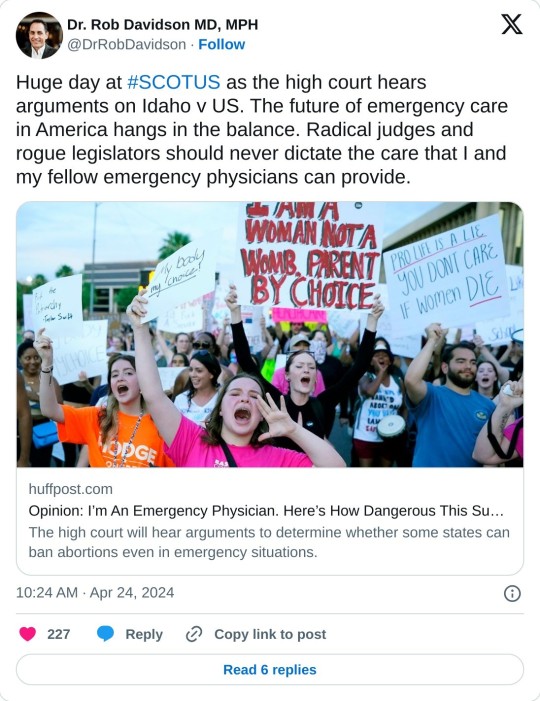
Arguments in the case have sparked multiple demonstrations, from a weekend rally in Boise, Idaho to a Wednesday gathering outside the U.S. Supreme Court in Washington, D.C., where Women's March organized a die-in to highlight the potential consequences of the forthcoming ruling.
"It's a horrifying time to be someone who needs critical abortion care in America right now," said Women's March executive director Rachel O'Leary Carmona. "The GOP is chipping away at women's bodily autonomy and livelihoods one illegitimate court case at a time—from fast-tracking a case on the authorization of a medication that's been safely administered for decades last month, to now bringing the fate of emergency abortion care to a Supreme Court captured by their radical, anti-choice agenda."
"We know what these cases really are: They're part of a series of efforts by Christian nationalist politicians to do anything they can to control women's bodies and cut back women's decisions about their healthcare, their family planning, and their lives," she added.
Similar warnings about far-right Christian nationalist attacks on a range of rights have dominated political contests this cycle—including the race for the White House. In November, Democratic President Joe Biden, who supports access to abortion care, is set to face former Republican President Donald Trump, who brags about appointing three of the six justices who reversed Roe.
The case has renewed arguments for considering changes to the country's top court, which over the past few years has not only seen plummeting levels of public trust but also been rocked by repeated ethics scandals.
"Idaho's abortion ban is a direct consequence of the court's radical decision to overturn Roe v. Wade and allow partisan state legislatures to determine Americans' access to abortion care," said Stand Up America managing director of policy and political affairs Brett Edkins. "If the Supreme Court once again sides with anti-abortion extremists, it will be further proof that this court is radically out of touch with the American people and must be reformed."
19 notes
·
View notes
Text
S.474, the Fetal Heartbeat and Protection from Abortion Act, prohibits abortions after a fetal heartbeat has been detected, with exceptions for the life or health of the mother, medical emergencies, fatal fetal anomalies, and, up to twelve weeks of pregnancy, in cases of rape or incest.
Gov. Henry McMaster signed S.474 into law in late May after it passed in the South Carolina General Assembly. The act was quickly met with a lawsuit from Planned Parenthood that challenged its constitutionality. Following the lawsuit, a judge ordered a freeze on the six-week abortion ban.
In its ruling, the South Carolina Supreme Court vacated the injunction and declared S.474 is constitutional under state law.
36 notes
·
View notes
Text
Hey Tumblr! Black women in the US are at a higher risk of dying from pregnancy-related complications. Let's address this issue during Black Maternal Health Week. We can eliminate racial disparities in maternal health by addressing systemic racism and poverty and supporting access to quality healthcare services. Join us in advocating for policy changes and supporting community-based organizations working towards improving maternal health outcomes for Black women.
Black Maternal Health Week: Addressing Racial Disparities in Maternal Health
Maternal health is an essential issue in the United States, and Black Maternal Health Week is a week-long initiative aimed at addressing the racial disparities in maternal health outcomes. The week takes place every year from April 11th to April 17th, and it is an opportunity to raise awareness about the challenges faced by Black women during pregnancy and childbirth.
The Centers for Disease…
View On WordPress
#Black Community#Black Lives Matter#Black Maternal Health Week#Black Moms Matter#Community Support#Health Disparities#Maternal Health#Maternal Mortality#Racial Justice#Reproductive Justice#Support Black Women
8 notes
·
View notes
Text
i don't know why i wasn't as convicted on surrogacy before but there's truly something so insidious about buying a child and using a woman's womb for rent. evil, evil practice.
125 notes
·
View notes
Photo


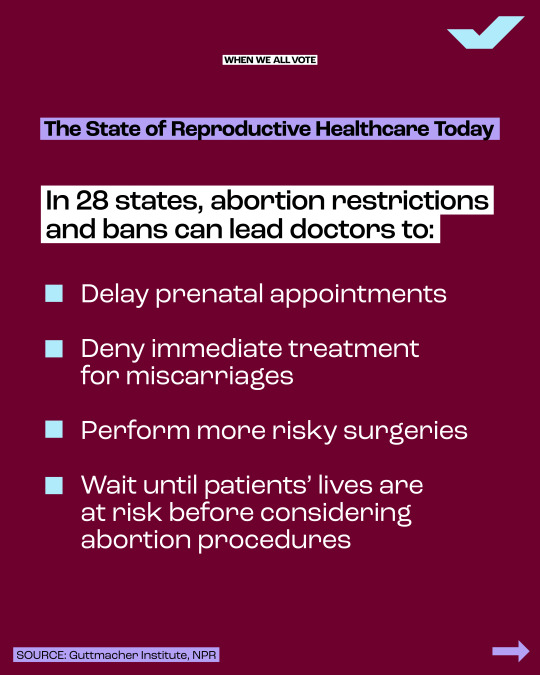
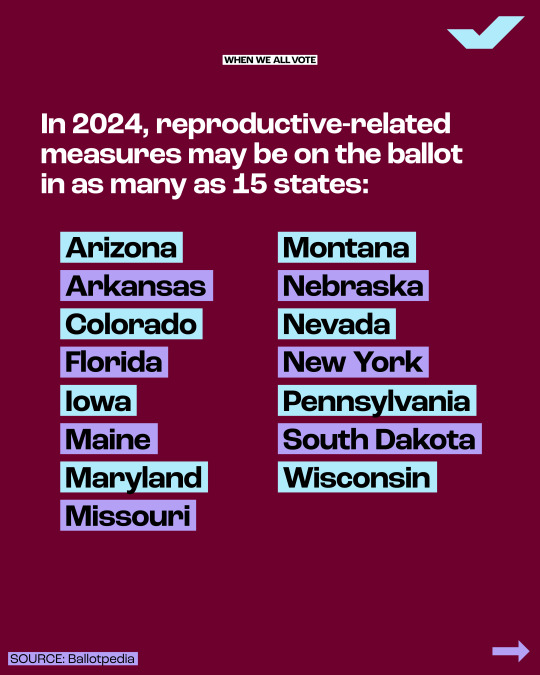


Today, the U.S. Supreme Court is hearing oral arguments in FDA v. Alliance for Hippocratic Medicine — a case that will decide national access to Mifepristone, a medication abortion pill used in over 60 percent of abortion procedures nationwide. In light of this case, we’re here to share an important reminder: Reproductive Care is Healthcare, and it’s on the ballot this year.
Across the country, elected officials are failing to protect Americans’ right to make decisions about their bodies, families, and lives. Attacks on reproductive rights restrict Americans’ access to standard pregnancy care and worsen maternal health overall.
In 2024, reproductive healthcare is on the ballot in as many as 15 states. Your vote is your voice. Make sure you’re registered NOW at weall.vote/register — then remind three friends to check their registration too.
#mifepristone#scotus#supreme court#abortion#medication abortion#reproductive healthcare#reproductive rights#reproductive freedom#reproductive health#ballot#election#elections#voting#vote#pregnancy#maternal health#register to vote
9 notes
·
View notes
Text

A lot of abortion funds are running out of cash right now. Buckle Bunnies is pretty typical. Those large one time donations helped in the immediate wake of things, but long term, they'd LOVE monthly donors so they know there's going to be money there next month too, even if its just $3 so they can help keep phone line active!
Toss some money to your local abortion fund as things get tight. Or one in a state with a more restrictive ban. Having to travel out of state greatly raised costs!
17 notes
·
View notes
Text
'A woman who falls through the cracks is falling with her children'
Away from threat of Islamist violence or floods, health risks for pregnant women in Nigeria's refugee camps remain high
By Adie Vanessa Offiong, CNN
Photographs by Taibat Ajiboye for CNN
Editor’s note: This story is part of As Equals, CNN's ongoing series on gender inequality. For information about how the series is funded and more, check out our FAQs.
Abuja, Nigeria (CNN)Aisha Aliyu is eight-months pregnant and sprawled out on a mat in front of her house with four of her children spread around her feet. Two-year-old Hauwa and five-year-old Abba are both crying and tugging at their mother's coffee-colored hijab. She, in response, rolls her eyes and clicks her tongue at them. She looks tired.
The child Aliyu is carrying is her tenth. The last four were delivered in the Durumi Camp, a place in Nigeria's capital city, Abuja, that she and an estimated more than 3,000 other internally displaced people call home.
In 2013, Aliyu fled her home in the village of Wala in Nigeria's northeastern Borno State to its capital, Maiduguri. She said her village was attacked and much of it burned down by armed Islamist group, Boko Haram. Two years later, the militant group attacked Maiduguri, forcing Aliyu to again migrate, this time travelling over 856km south to Abuja with her husband and five children.
The now 39-year-old saw having many children as a way of replacing her relatives killed by the insurgents, but reveals she was done after her last pregnancy in 2021 and began using contraceptives. However, she became pregnant again this year.
Having already borne children in Durumi camp (one of 264 communities for internally dispaced people (IDPs) known to exist across Nigeria as of September 2021), Aliyu was fearful, knowing of the limited resources she would have access to. The farmer's wife had been unable to afford the food and medication she needed to stay healthy, and antenatal services were limited.

Aisha with five of her children
The space initially set up as a birthing suite at the camp was rudimentary and barely hygienic, explains Liyatu Ayuba, appointed the camp 's Women's Leader by the site's Chairman when she arrived in 2014. She has since handled issues regarding health, food or children on behalf the IDPs.
"It was a tent that we swept, and I would put a mat or wrapper on the floor for the women to lie down on to give birth," says Ayuba, who for much of the camp's history has been its only birth attendant. Many of the displaced women refer to her as Mama.
Ayuba says the tent was a shanty built with corrugated roofing sheets and a sandy floor. If gloves were available, the birth attendant used them and if not, she explains that she covered her hands with polythene bags and cut umbilical cords with a razor blade.
"I gave birth to three of [my children] with Mama's help on a mat under the shelter," Aliyu tells CNN, referring to the birthing tent. "Mama cut the umbilical cord and bathed the baby."
In 2019, a non-governmental organization set up the camp's health post where Aliyu's ninth child, Hauwa, was delivered in 2021. The post is a small clinic located inside a repurposed 20ft shipping container, where wooden boards partition the space to create a delivery suite which looks more like a storage space and just about holds a bed, a baby cot, a drip stand, a broken chair, a trolley and empty containers that should contain water. The other half is the consultation room with a table, two chairs, a bed, and a cupboard where medicines and devices are kept.
Though basic, the clinic at least provides a consultation space that women previously had to make do without and Ayuba is proud to say the camp has not recorded any deaths among mothers or babies under her watch.
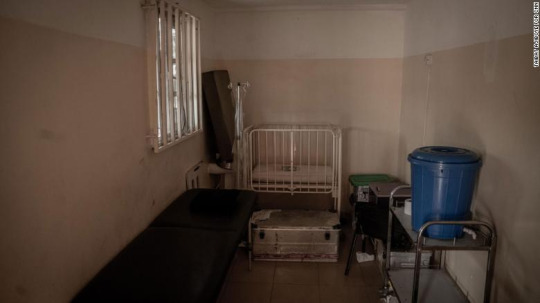
The makeshift delivery room partitioned in the shipping container used as the camp's health post
'No 'special arrangement' for those who are pregnant in Nigeria's camps
Aliyu is one of many internally displaced women bearing children in Nigeria's camps, with some grounds not even housing a health post or shelter for birth, instead needing women to go into labour in their own shelters or that of their birth attendant.
A 2021 PhD thesis by Fatima Mahmood Jibirilla at Walden University, states that women living in IDP camps in Nigeria "have a higher risk of maternal death than women living in their homes." The author cited a range of factors increasing the risk of maternal and neonatal deaths in these settings, including inadequate prenatal care services and limited family planning programs.
"There are no special arrangements for pregnant women in IDP and refugee camps [in Nigeria]. There are poor antenatal services that are inadequate to detect and address likely pregnancy-related complications and other signs of poor pregnancy outcomes," the author writes. While there have been no maternal or infant deaths at Durumi on her watch, according to Ayuba, multiple doctors volunteering there and across camps in Abuja corroborated the concerns highlighted in the study to CNN.
In a country that has long had among the highest maternal mortality rates in the world and has the third highest number of internally displaced people (IDPs) in Africa as of the end of 2022, according to the Internal Displacement Monitoring Centre (IDMC), the lack of adequate maternal healthcare provision in these camps is a significant concern, one of the doctors told CNN.
The 2022 IDMC figures also show that 4.5m Nigerians were classed as "internally displaced people" as a result of both conflict and natural disasters, with flooding outstripping protracted violence as the main source of displacement.
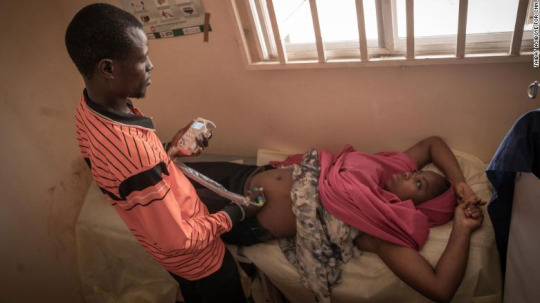
The camp nurse, Isa Umar examines a pregnant woman during antenatal session
While there is no national breakdown of IDPs by sex or age, a 2023 report by the Camp Coordination and Camp Management (CCCM) Sector says there are 1,575,741 women and children in the Nigerian states of Borno, Adamawa, and Yobe alone, making up 74% of the 2,124,053 IDPs in those states.
Nigeria's total IDP population relies largely on the graces of charitable organizations for its health care, Ayuba and the camp's nurse Isa Umar told CNN.
'If it happens, I am dead.' The prohibitive costs of care
Wednesdays are antenatal day in Durumi. When CNN visits, camp nurse Isa Umar, who himself was forced to leave his home due to the insurgency, is in the consultation room using a handheld ultrasound scanner to monitor a baby's growth and a fetoscope to monitor the heartbeat among the expectant mothers coming in.
Umar measures each pregnant woman's stomach followed by her weight. After they've been seen, women compare notes while sitting on the clinic's veranda, discussing how any of the medicines Umar has prescribed will be paid for.
The set up is far from adequate. Umar tells CNN: "We don't even have folic acid or anti-malarial medicine to give them. I have to write these for them to go and buy." Malaria is endemic in Nigeria and infections pose various risks during pregnancy, such as premature labour and miscarriage, and folic acid is recommended for those who are pregnant or planning to become pregnant, to reduce the risk of certain birth defects.
But for most of the 64 women recorded in the camp's birth register this year, these costs are prohibitive. Folic acid, for example, costs ₦3,000 ($3.74) for 100 tablets and Aliyu tells CNN she could not possibly have afforded that cost for the duration of her pregnancy. She says she's only been able to take this vital supplement when NGOs have donated them free of charge. Back home in Wala, her N100 ($0.11) hospital card had entitled her to free folic acid as well as other resources while pregnant.
Getting clean water at the camp is also a challenge, Aliyu shares, explaining that it's a time-consuming, strenuous task requiring her to make several trips daily and is one she can no longer do in the final weeks of her pregnancy. Instead, she now pays for it to be delivered. At its cheapest, enough water to make the family's breakfast of pap (porridge made from ground corn) and other domestic chores for a month costs ₦24,000 ($28.43). Costs can rise by 25% on days when there is no electricity and a generator is needed to work the pumps, or when water sellers must go farther to fetch it.
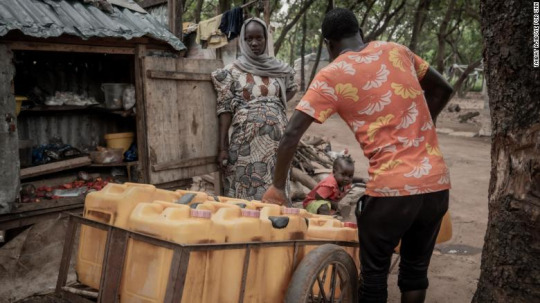
With Aisha almost full term, she is no longer able to go to fetch water and now has to pay up to N500 daily for it to be delivered to her home
There are also the costs of giving birth in Abuja that Aliyu didn't have back home.
To immunize her babies at the camp, the mother of nine has to take them to the nearest government hospital where nurses have certain expectations that fall to the mother, she tells CNN. These include making sure the baby is wearing diapers and bringing various items including cotton wool and baby lotion, which would cost money Aliyu says she doesn't have.
"In Borno, it was not compulsory to use [diapers] when going to the hospital. We just used our wrappers (a piece of fabric women tied around their waist). But here, the nurses insist that (the babies) must wear diapers and (we must) have an extra one in our bag," Aliyu says. Multiple mothers shared similar concerns with CNN.
Dr Charles Nzelu, Head of Special Duties at Nigeria's Federal Ministry of Health tells CNN he believes health workers are simply acting in the overall interests of the baby and that a lack of medical skill, experience, and communication is resulting in a lack of understanding about the women living in the IDP camps. "When you come to me as a doctor, I will give you medical advice the way it's supposed to be," he explains. "When you are more experienced, you are flexible (with) the way you relate with patients." He adds that this government, which came into power in May, will work to address issues like these.
"I can't afford treatment. If it happens, I'm dead"Pregnant resident of Durumi Camp in Abuja, Aisha Aliyu
In the meantime, Aliyu says she is struggling to meet all her needs and those of her children. To afford what she can, Aliyu makes and sells wigs and traditional caps worn by men, earning on average ₦10,000 ($12.49) a month.
Money is not her only concern. Aliyu worries about catching malaria and about not being able to produce enough breastmilk because of the poor quality of her diet. Her family survives on staples such as pasta and maize in different forms.
"I can't afford the treatment" for malaria, says Aliyu. "If it happens, I am dead."
Difficulty fulfilling promises
The National Commission for Refugees, Migrants and Internally Displaced Persons (NCFRMI) is responsible for Nigeria's growing number of displaced people. Its commissioner tells CNN that the organization, which was set up in 1989 and has a health budget of N250 million for 2024, has paid for midwives to visit IDP camps to assist in deliveries of babies as frequently as funds allow and has, in some instances, also paid off people's hospital bills. CNN was unable to verify this budget figure provided by the Commission which it said is not yet public.
However, some of the IDPs who have been in Durumi since the informal settlement formed in 2014, say that no midwives sent by the Commission have visited the camp during their time here and that in the past, it has been difficult to get it to fulfil promises they say the Commission made to the camp, such as furnishing the health post with an additional bed, scanning machine, gloves and other health equipment.
CNN asked the NCFRMI about the services it provides to those in Durumi but did not receive a response prior to publication.

The nurse takes the weight of the pregnant women during antenatal
Within the Federal Capital Territory (FCT), where Abuja is located, the Territory's Health and Environmental Services is responsible for all health matters including services provided to people in IDP camps, including reproductive care and sexual health services, such as birth control. Dr. Dolapo Fasawe, Mandate Secretary of the FCT Health and Environmental Services, tells CNN that IDP camps in the area have functional clinics supported by area council staff and partners from outside, explaining that they cannot build permanent structures because the camps are meant to be temporary. She adds her belief that "the issue with maternal care in such places is child spacing, not maternal mortality." Birth spacing helps to improve maternal health outcomes as becoming pregnant too soon after giving birth increases the risk of complications. Doctors CNN spoke to also highlighted this as a concern in the camps, and Nigeria more widely.
But many residents of the camp told CNN they had not heard of the FCT Health Services or seen them at the camp and explain that the provision of birth control is again handled by non-profits working in the camps. When Fasawe was informed of this by CNN, she said it was a wakeup call for her department to act promptly. This "has opened our eyes to the need to focus on them," Fasawe says. "We need to (conduct some) outreach asap."
Nigeria's Federal Ministry of Health oversees health for the country (including provisions provided by the Commission). In response to the concerns, the Ministry of Health's Nzelu tells CNN that maternal and child health is a very high priority for government but explains that the Ministry primarily provides policies and guidelines for states, local governments and government agencies to follow and does not typically intervene directly. He said: "As a government, we are still working to make sure that both the state and all these agencies of government that are charged with the direct implementation, do their best to make sure that those inhabitants of IDP camps are well taken care of."
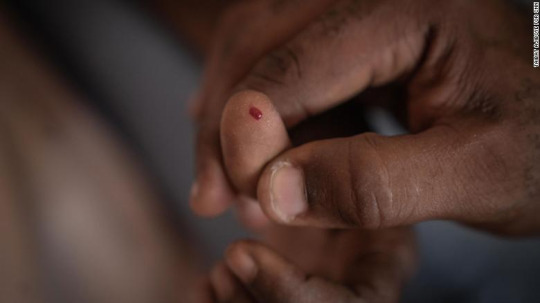
A volunteer doctor brought his own kit to do blood tests at the Durumi camp
'A woman who falls through the cracks is falling with her children'
African NGO, Pro Health International, has been sending volunteer medical professionals to provide free healthcare services for IDPs across Nigeria for over 12 years. They were last in Durumi in June and describe it as one of the most impoverished IDP camps within the Federal Capital Territory (FCT), where Abuja is located.
Pro Health International Founder and Executive Director Dr. Iko Ibanga shared that his team raised the issue of health challenges within IDP camps two years ago with the Minister of Health at the time, Dr. Osagie Ehanire. "We were told it would be looked into, but nothing was done," he says.
Ehanire did not directly respond to CNN about whether Pro Health International raised the issue of health challenges among internally displaced people with him, but the former health minister highlighted the NGO's work as a useful implementer of maternal health services in more recent years, and shared emergency response plans for IDPs that were put in place in the north-east of the country (where Boko Haram is most active) and go back to 2016. He tells CNN: "Women's Health services were prioritized and featured strongly in the programs designed to the needs of internally displaced women." This region does not include Abuja, however, where the Durumi camp is located.
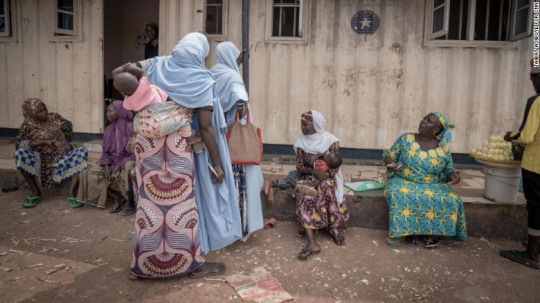
Women at the Durumi IDP camp, sitting on the veranda of the makeshift health post
The 2023 health budget is ₦1.17 trillion ($2.2bn), which is a 42.6% increase since 2022 and the highest percent of the total budget allocated for health. But In Africa's largest economy, this is only 5.7% of the annual budget of ₦20.5 trillion, and is much lower than the 15% of annual budgets all African Union member nations, including Nigeria, pledged in 2001 to spend on "improvement of the health sector".
According to the National Primary Health Care Development Agency, a health post, which is the most basic health care facility, should be able to cater to a population of 500 and have 34 items always available to serve that population. Durumi's health post serves more than 3000 people and has just 10 of these items: a waste bin, scissors, fetoscope, weighing scale, chair, tables, two beds, kidney dishes, and a cupboard, all provided by NGOs according to Ayuba and Umar who say they both manage the facility without a salary.
Nzelu shares that the Ministry of Health is currently conducting a health needs assessment in most of the IDP camps to learn what is and is not lacking to ensure adequate health care services. He tells CNN: "With the budget cycle currently on, it can inform some of the things we are able to get into the budget and hope that the National Assembly gives approval so that we can implement."
Pro-Health International's Ibanga is emphatic about the risks displaced people face during the perinatal period and beyond. "When [a woman] is ill, it affects everything tied to her and her children are the most important things tied to her," he says. "A woman who falls through the cracks is not falling by herself. She is falling with her children."
This story was edited by Eliza Anyangwe and Meera Senthilingam
#Nigeria#Nigerian women#Maternal health#Pregnancy while displaced#As Equals#Durumi Camp#Abuja#Book harassment#internally dispaced people (IDPs)#A refugee camp had only one birth attendant#The birth attendant didn't always have surgical gloves#Folic Acidcosts ₦3000 ($3.74) for 100 tablets#Refugees and access to clean water#Refugees and malnutrition#Refugees and preventable diseases#Refugees and access to birth control#A woman who falls through the cracks is falling with her children
10 notes
·
View notes
Text
#abortion#abortion bans#post roe america#infuriating#maternal health#reproductive justice#reproductive care
13 notes
·
View notes
Text
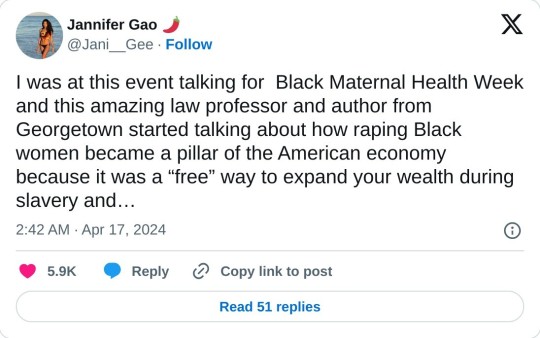
[x]
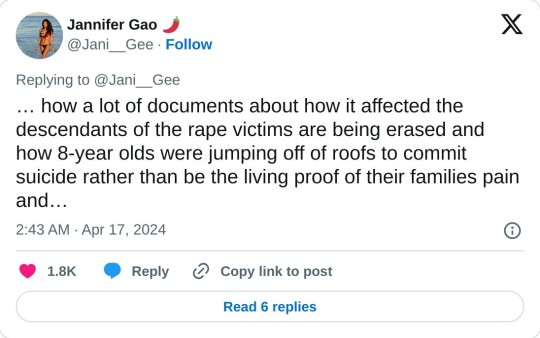
[x]

[x]

[x]
#rape#forced birth#reproductive rights#Black women#slavery#transatlantic slave trade#history#slave breeding#u.s. history#maternal health#suicide#slave suicides#Black tumblr#race
2 notes
·
View notes
Link
“Bangladesh has achieved a huge success in reducing infant and maternal mortality rates in the last five decades, securing the top position in South Asia.
According to the World Bank's estimation, the current infant mortality rate for Bangladesh is 21 deaths per 1000 live births making 85% decline from 1971 as the rate was 141 deaths during Bangladesh's independence.
According to health experts, Bangladesh achieved unprecedented success in every health index in the last 50 years since independence...
According to Health and Family Welfare Ministry, Bangladesh maternal mortality rate was 269 per 100,000 live births in 2009. The ratio has reduced to 165 recently.
The government has set a target to reduce maternal mortality to less than 50 per 100,000 live births...
After the independence, the Bangladesh government had put emphasis on maternal health, family planning, child nutrition and so on.
Special importance was also given on different five-year plans, health policy and latest health, population and nutrition programme. Special allocation was also kept at annual development programme (ADP) on those issues.
Annual Global Childhood Report 2019 of the humanitarian organization "Save The Children" says child mortality rate has reduced to a great extent in Bangladesh, Bhutan, India and Nepal in the last two decades.
Among the four countries, Bangladesh has made the highest progress. The child mortality ratio declined 60% in Bhutan, 59% in Nepal, 57% in India, [and] 63% in Bangladesh in the last two decades...
Family Planning Directorate Assistant Director Matiur Rahman said that 3,364 union health and family welfare centres are providing maternal and child health facilities apart from family planning services across the county.
Of them, 2189 union health and family welfare centres are providing 24 hour safe delivery facilities every day.”
-via The Business Standard, 6/14/22
#cw infant death#cw prengancy death#bangaldesh#public health#unicef#infant health#infant mortality#infant loss#maternal mortality#maternal health#heathcare#healthcare access#good news#hope
22 notes
·
View notes
Text
TW: medical negligence, gaslighting, and birth trauma are discussed. But so worth the read. Women and their children have a right to the best care possible.
105 notes
·
View notes
Text
Birth Doulas: Empowering Support for Expectant Families
Shaina Tranquilino
December 12, 2023

Bringing a new life into the world is an incredible journey filled with joy, anticipation, and sometimes, uncertainty. During this transformative time, many women seek additional support to ensure a positive birth experience. Enter birth doulas – compassionate professionals who provide continuous physical, emotional, and informational assistance before, during, and after childbirth. In this blog post, we will delve into what birth doulas are and explore their invaluable role in empowering expectant mothers.
Understanding Birth Doulas:
A birth doula is a trained individual who offers non-medical support to expectant mothers throughout the entire childbirth process. These dedicated individuals are typically experienced in various birthing techniques and possess extensive knowledge of the physiological and emotional aspects of labour and delivery.
Their Role:
1. Emotional Support:
Birth doulas provide unwavering emotional support during pregnancy, labour, and postpartum periods. They assist expectant mothers by actively listening to their concerns, fears, hopes, and dreams surrounding childbirth. By offering empathy and reassurance, these caring professionals help alleviate anxieties while fostering confidence.
2. Continuous Physical Comfort:
Doulas employ an array of comfort measures to ease discomforts associated with labour pains such as massage techniques, breathing exercises, relaxation techniques, positioning suggestions, and more. Their presence ensures that the mother's physical needs are addressed consistently throughout the birthing process.
3. Advocacy & Communication:
One significant aspect of a birth doula's role is to act as an advocate for the mother's preferences and desires when communicating with healthcare providers or medical staff. This may include discussing pain management options or ensuring the mother has access to accurate information about procedures being performed.
4. Informational Support:
Birth doulas empower expectant mothers by providing evidence-based information on various aspects of childbirth like different birthing positions or breastfeeding techniques. They ensure that the mother is well-informed, enabling her to make educated decisions regarding her birth plan.
5. Partner Support:
Birth doulas also extend their support to partners or other family members involved in the birthing process. By guiding them on how best to assist and comfort the labouring mother, doulas help create a harmonious environment where everyone feels included and informed.
Benefits of Hiring a Birth Doula:
The advantages of having a birth doula during childbirth are numerous:
1. Increased Satisfaction: Studies have shown that women who receive continuous support from a birth doula report higher levels of satisfaction with their birthing experience.
2. Reduced Interventions: Research indicates that with the presence of a doula, there is often a decrease in interventions like cesarean sections and epidurals, leading to more positive outcomes for both mother and baby.
3. Emotional Well-being: The emotional support provided by birth doulas significantly reduces stress levels for expectant mothers, promoting overall emotional well-being throughout pregnancy and beyond.
4. Lowered Risk of Postpartum Depression: Women supported by birth doulas tend to have lower rates of postpartum depression due to the consistent guidance and nurturing they receive during the vulnerable post-birth period.
Birth doulas play an essential role in ensuring positive experiences for expectant mothers during childbirth. Their unwavering support, knowledge, and advocacy empower women to navigate this transformative journey confidently. By providing physical comfort, emotional reassurance, informational assistance, and acting as an advocate, these dedicated professionals contribute significantly to creating fulfilling and empowering birthing experiences for all involved.
#birth doulas#doula#doula support#pregnancy companion#empowered birth#maternal care#birth journey#supportive doula#birth preparation#labour and delivery#holistic birth#childbirth support#doula services#pregnancy wellness#labour coach#empowered motherhood#maternal health#birth experience#doula love#birth advocate
4 notes
·
View notes